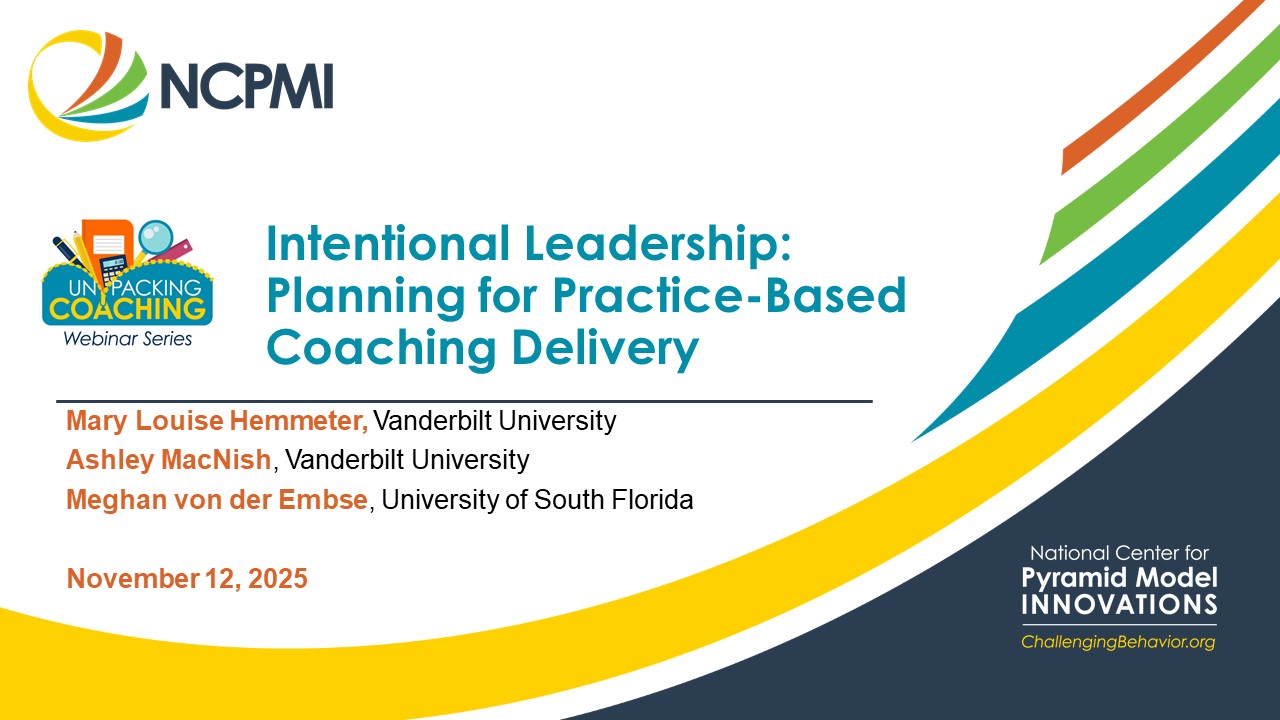The Program Implementation Coach (PIC) has an important role in the statewide implementation and scale-up of the Pyramid Model.
- Coaches leadership teams (Program and Community) to implement the Pyramid Model program-wide or community-wide.
- Provides coaching and guidance to a program’s practitioner coach.
- Provides updates to the State Leadership Team (SLT) about the implementation needs and progress of communities and programs.
- During scale-up, the SLTs and PICs continue to focus on sustaining the fidelity of implementation at all programs while scaling to new communities and programs.
An Essential Structure of Statewide Implementation
PICs are one of four “essential structures” of statewide Pyramid Model implementation and are linked to each of the other essential structures. These are as follows:
- The State Leadership Team (SLT): is comprised of multiple early childhood sectors, potentially bringing a variety of funding sources to the table and can braid funds to develop and support a network of PICs that can benefit a variety of early childhood education sectors. PICs function as liaisons between the state and implementing communities and programs to ensure the SLT has accurate information about implementation and training needs in sites.
- Professional Development Network of Program Implementation Coaches (PIC): The PIC guides and sustains the implementation of the Pyramid Model with fidelity by supporting local and community leadership teams. The PICs also support data use by these leadership teams and share the data with the SLT so data driven decisions are made at the community, program, and state levels for evaluation and sustainability.
- Implementation and Demonstration Sites: These sites benefit directly from PIC support, lessening the likelihood that Pyramid Model implementation is abandoned or implemented without fidelity to the model.
- Data and Evaluation Systems: These systems, when supported by PICs, facilitate sustainability because outcomes are measured and data can support determining what is working, what training and support needs remain, and what are continuing needs to sustain fidelity over time.
Related Resources
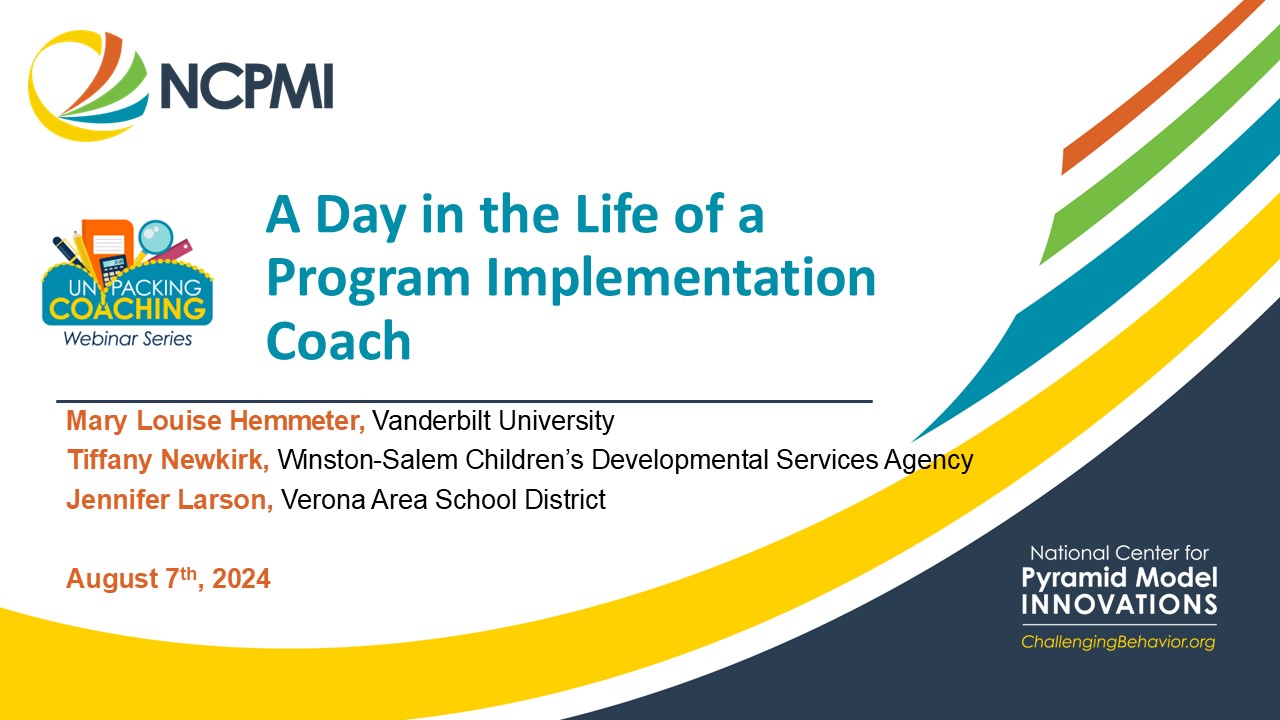
Are you interested in learning more about the role of a program implementation coach? This is the first in a series of webinars to support the program implementation coach in supporting the early childhood implementation of the Pyramid Model. In this webinar, we will unpack the many activities a program implementation coach might be involved in their work, and share our new resource collection full of great resources for program implementation coaches. Panelists will share their experiences supporting local leadership teams, other coaching activities, and managing their coaching responsibilities alongside their other roles in early childhood education.
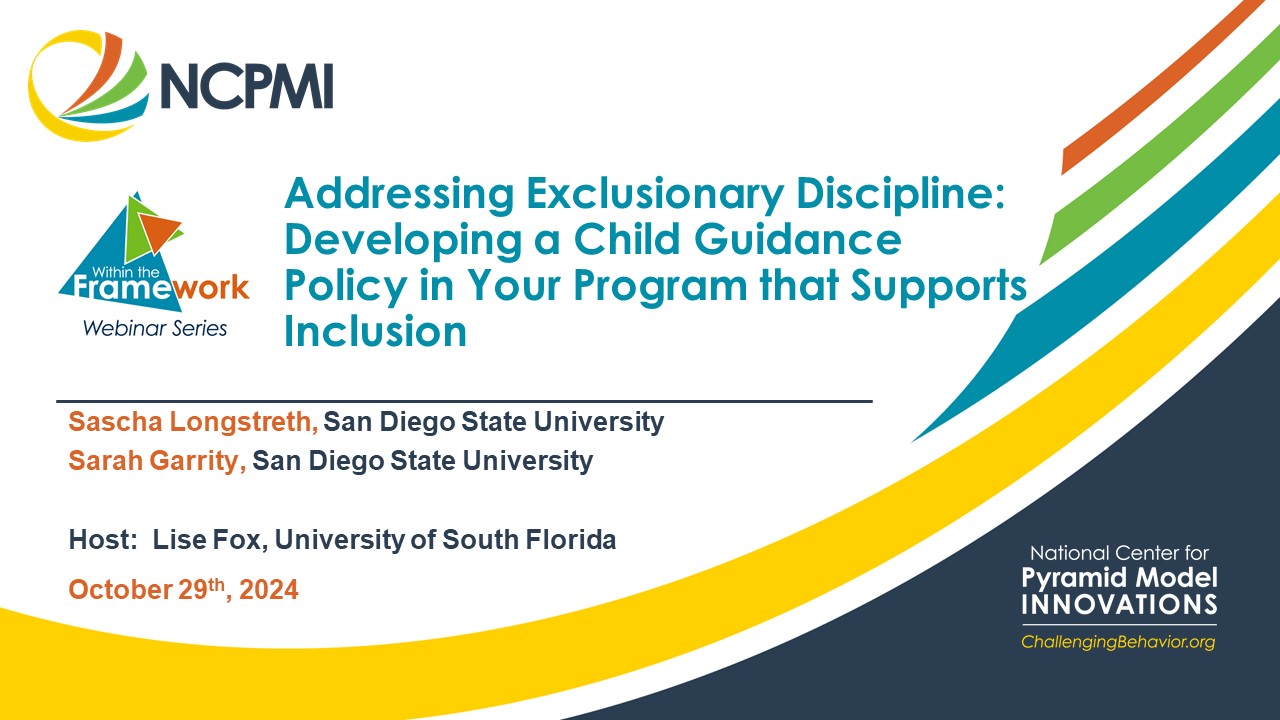
It is critically important that early childhood programs commit to teaching and supporting each and every child and eliminate the use of suspension and expulsion. This webinar will show how your program can develop a child guidance policy that reflects your commitment to all children’s social, emotional, and behavioral success. Our guest speakers have published two books that help early educators rethink and strengthen their discipline policies and create a child guidance policy aligned with a commitment to the Pyramid Model.

As a coach have you ever observed a teacher or early interventionist that seems down or is disengaged with children or families? Have you ever worried about the level of a provider’s stress? Have you been unsure what to say or how to help? Research has demonstrated a link between early childhood teachers’ poor health and mental health and decreased quality to provide high quality care for young children (Esquivel et al., 2016). Additionally, recent studies have identified early childhood teachers are more likely than the general population to have health and mental health challenges. Early interventionists often experience significant work stress related to the emotional toll of working closely with families who are worried about their children, heavy workload, and time constraints.
Motivational interviewing strategies can help. This webinar gives examples of how motivational interviewing strategies such as asking open ended questions, reflective listening, validating, affirming, offering empathy, and many more can support teachers’ well-being and improve teacher engagement in coaching and with the children in their care.
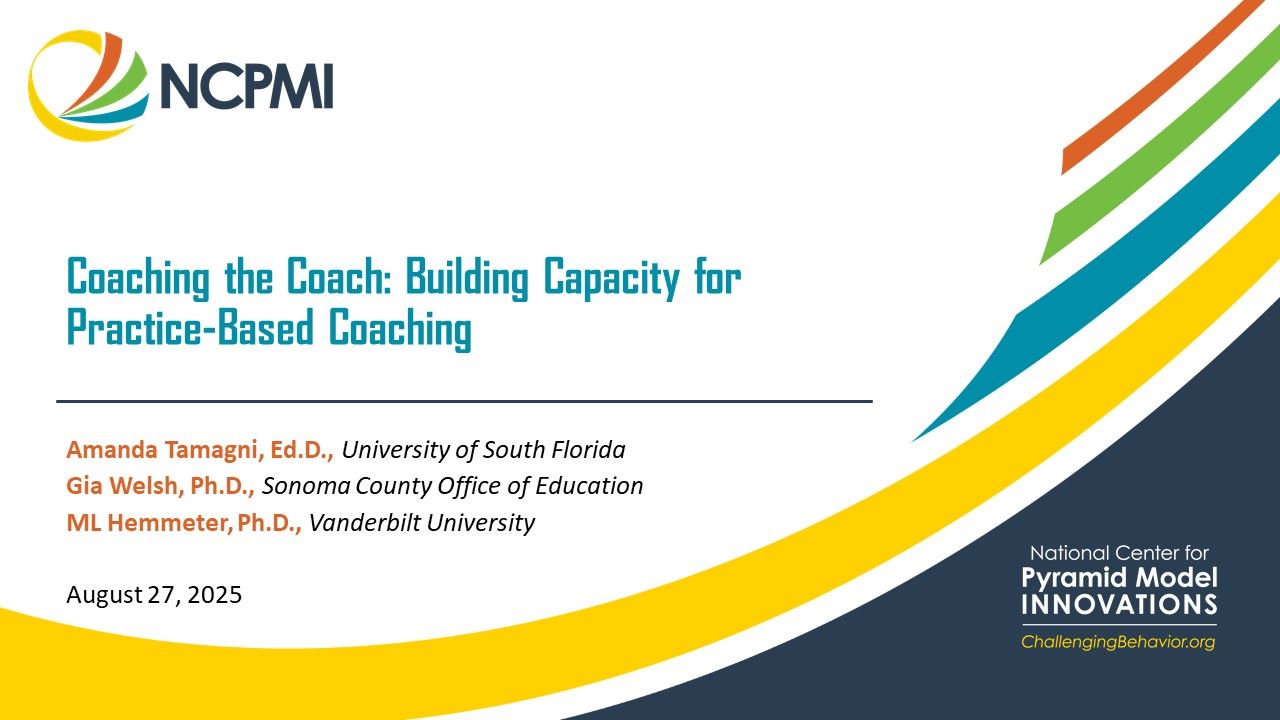
The role of practitioner coaches is to use Practice-Based Coaching (PBC) to build the capacity of early childhood practitioners to effectively use Pyramid Model practices to foster positive outcomes for young children. But who supports their knowledge and skill building?
Join us for a conversation featuring a program implementation coach and a practitioner coach as they share their experiences, practical strategies, and lessons learned in building the capacity of coaches within their early childhood program. Whether you are a program leader, coach, or professional development provider, this discussion will offer valuable perspectives on developing a sustainable coaching system.

Dr. Mariyn Torley, Principle of Clifton Early Learning Academy, explains how the Pyramid Model practices and using data-based decision-making helps to make effective change within her school.

Dr. Mariyn Torley, Principle of Clifton Early Learning Academy, explains how the Pyramid Model practices and using data-based decision-making helps to make effective change within her school.
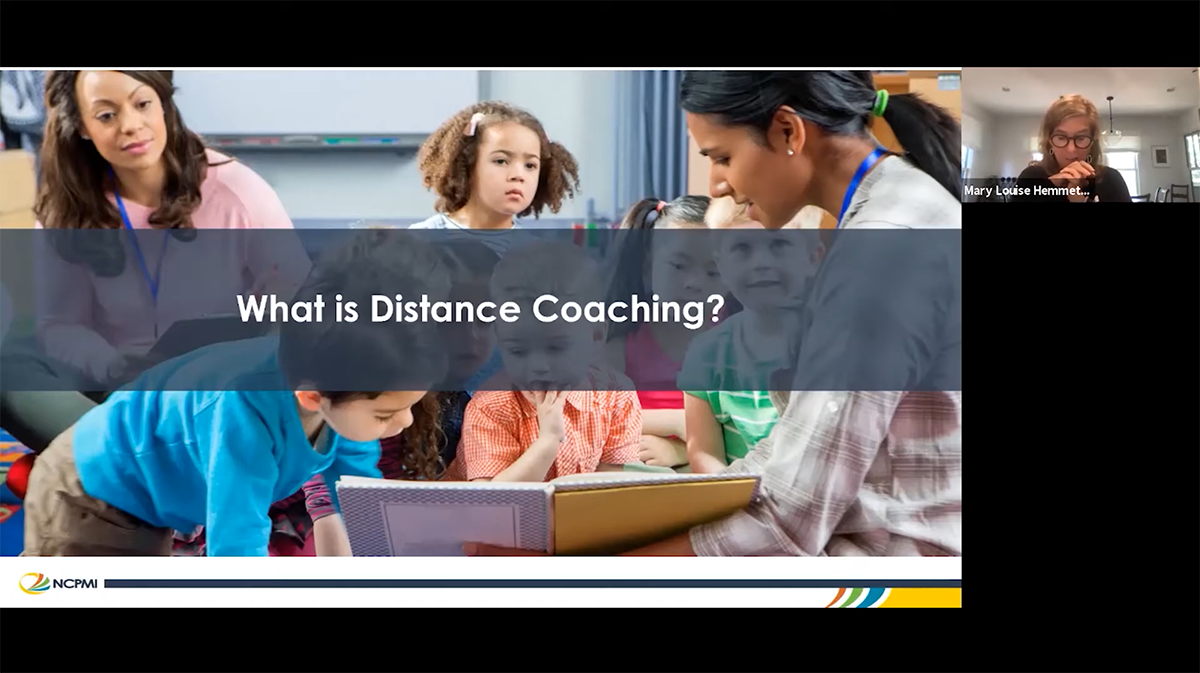
Distance coaching has been an option to address challenges in finding time and opportunities to meet. These challenges are especially evident in family childcare and rural settings. Due to our country’s recent events, many coaches are finding ways to do their coaching from a distance. We discuss distance coaching as one way to address this issue. We also discuss the successes and challenges of distance coaching through our panelists? experiences, and how program leadership teams and coaches can implement specific supports to make distance coaching successful.

In November 2024, the US Department of Education released guidance titled, “Using Functional Behavioral Assessments to Create Supportive Learning Environments.” In this video, we’ll hear from some voices from the field about how FBAs impact their teaching practices.
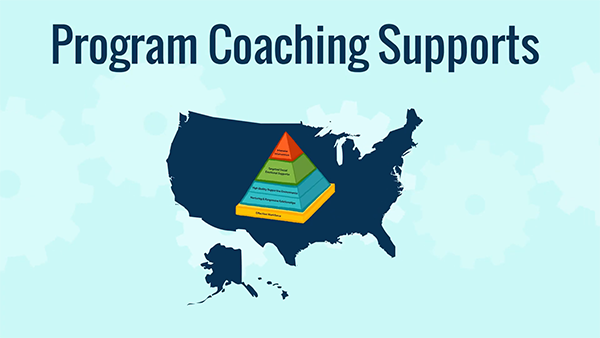
Overview of what a Pyramid Model Program Coach is, their requirements and responsibilities.

Overview of what a Pyramid Model Program Coach is, their requirements and responsibilities.

Guided Action Plans are customizable templates that give coaches and practitioners ideas as they collaboratively write goals for Pyramid Model implementation. Join us as we unpack this coaching resource, how it can be used, and share the experiences of a coach that has used the Guided Action Plan in their practice.
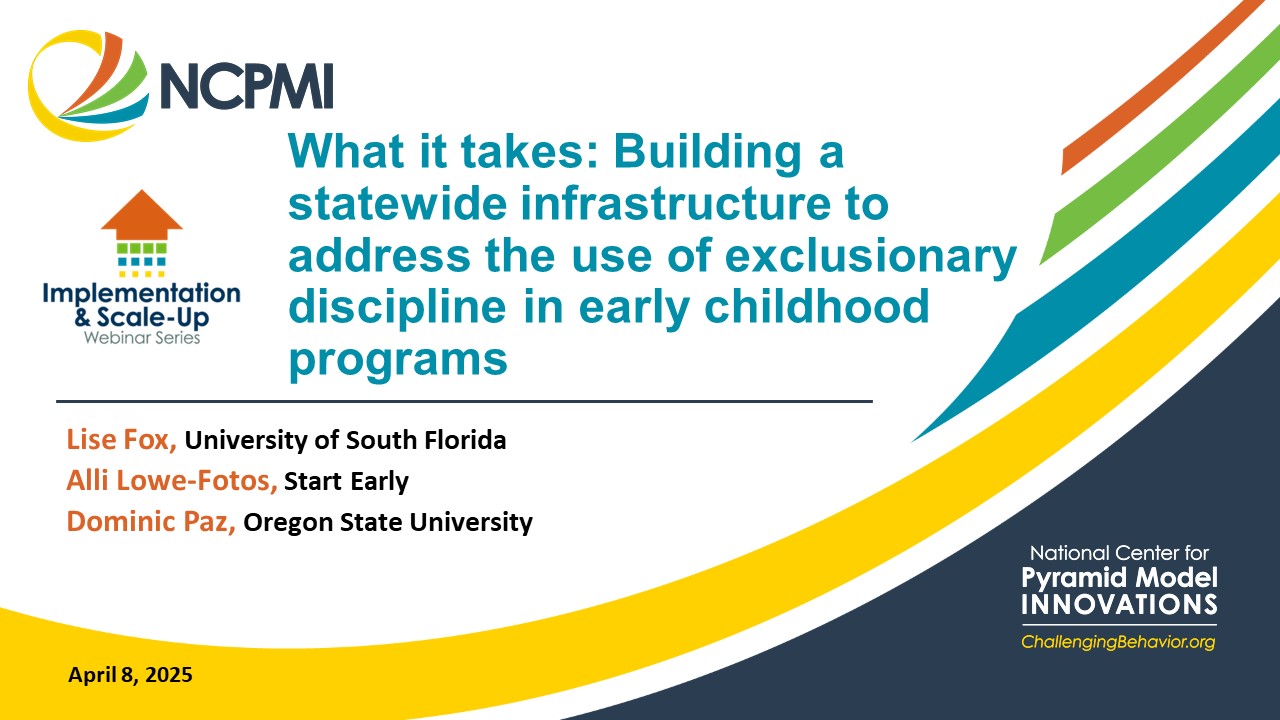
Dominic Paz (Oregon) and Alli Lowe-Fotos (Illinois), discuss the development of statewide systems, resources, and training efforts to combat the use of exclusionary discipline in early childhood education programs. In this discussion, the panelists talk about the importance of policy, training, and technical assistance for implementing the Pyramid Model, trauma-informed care, Infant and Early Childhood Mental Health Consultation, and other elements to prevent and address this critical issue.
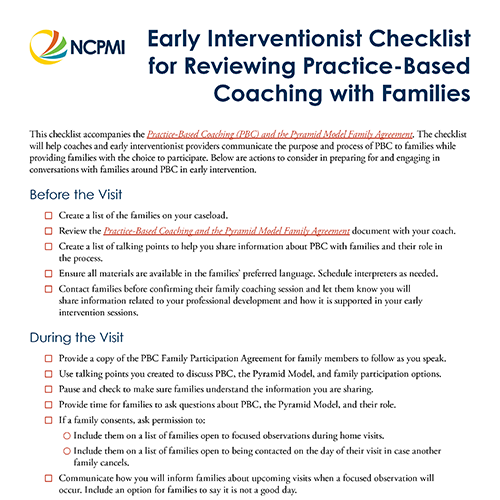
This checklist accompanies the Practice-Based Coaching and the Pyramid Model Family Agreement. The checklist will help coaches and early intervention providers create a plan to communicate the purpose and the process of Practice-Based Coaching (PBC) to families while providing families the choice to participate. Below are actions to consider in preparing for and engaging in conversation with families around PBC in early intervention.
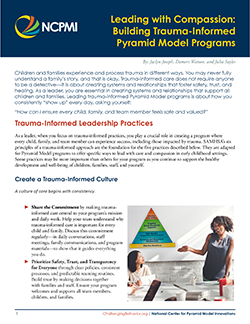
Leadership practices for creating systems and relationships that support staff, families, and children.
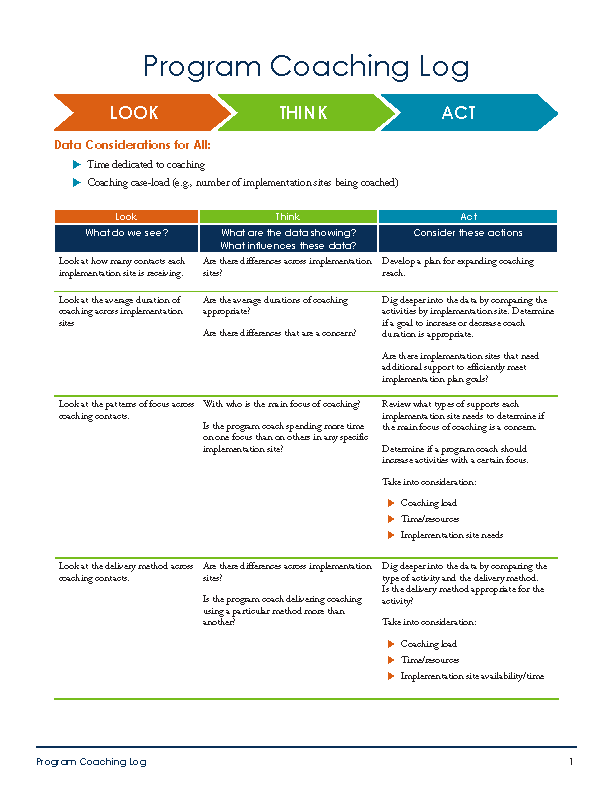
The Leadership Team can use this document to guide the three steps of data review and decision-making (Look-Think-Act). The guide provides the information on the data to review, the questions to consider, and potential actions. This guide is used with the data summaries of the Program Coaching Log.
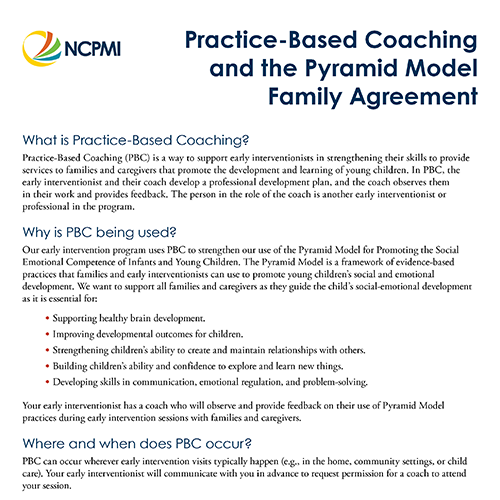
This handout can be used to guide early intervention providers to communicate the purpose and process of Practice-Based Coaching (PBC) to families while providing families with the choice to participate. Families can be provided a copy of the handout during a scheduled visit, and early intervention providers should engage in a discussion with families around the talking points outlined in the document. The Early Interventionist Checklist for Reviewing Practice-Based Coaching with Families can be used with this handout to help early interventionists and their practitioner coaches to prepare for discussions with families around PBC.
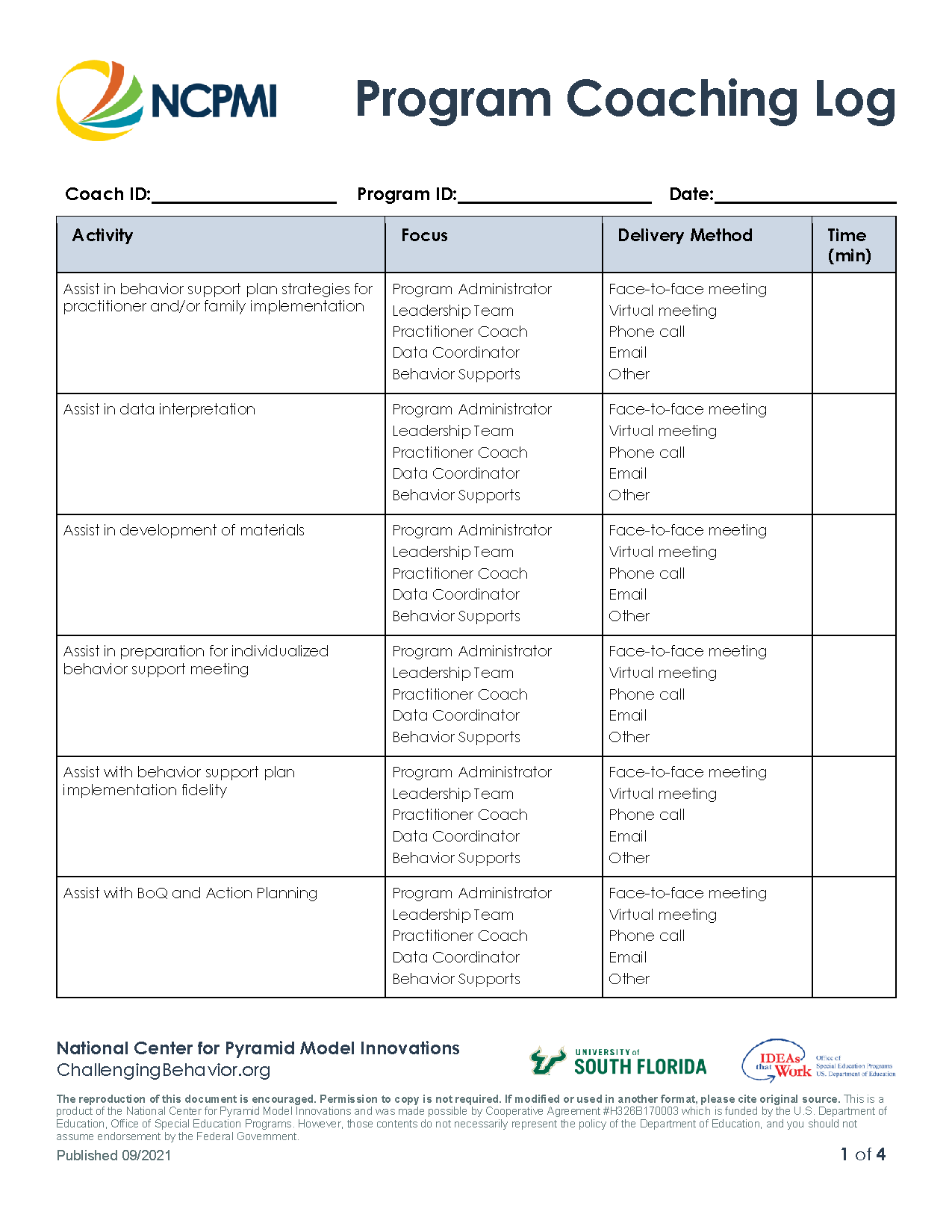
The Program Coaching log is used to log coaching activities to an implementation site.
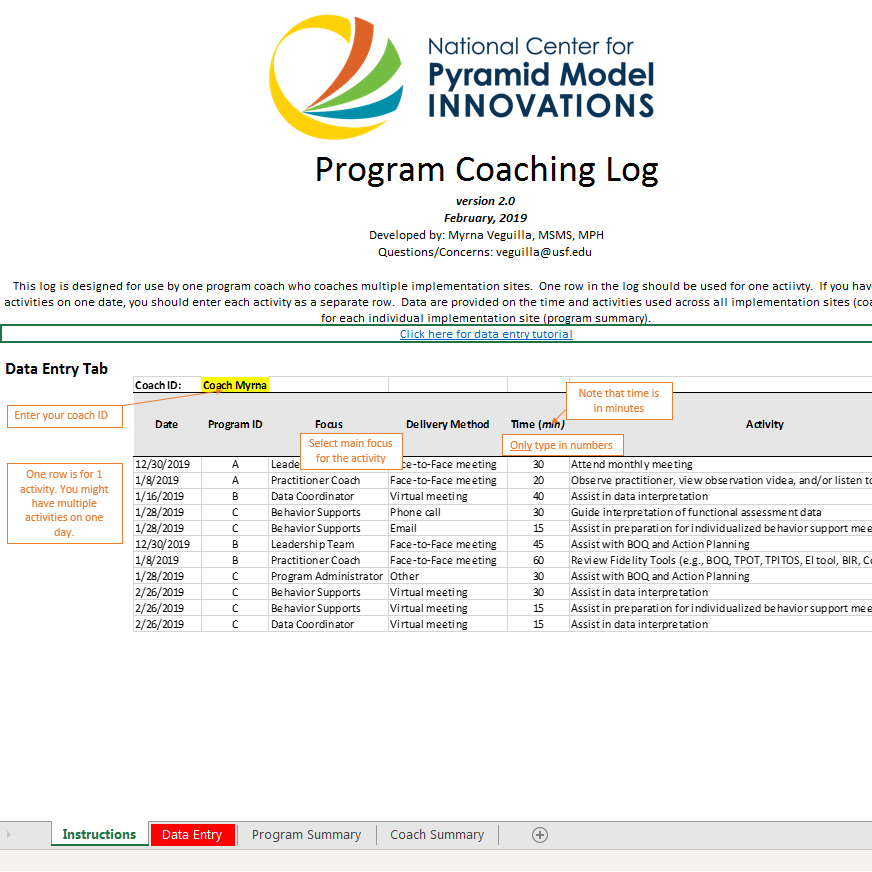
This spreadsheet is designed for use by one program coach who coaches multiple implementation sites.? Data are provided on the time and activities used across all implementation sites (coach summary) and for each individual implementation site (program summary).
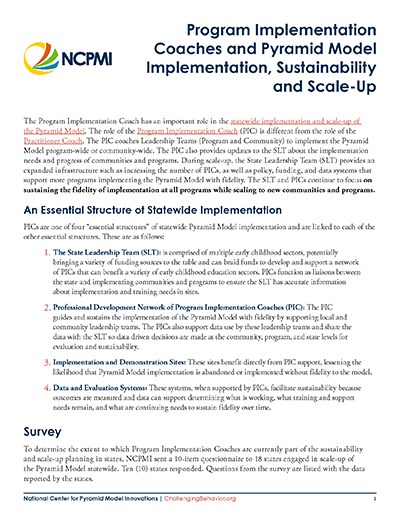
This fact sheet describes how states are implementing, funding, and planning for expansion and sustainability of their Program Implementation Coach cadre.
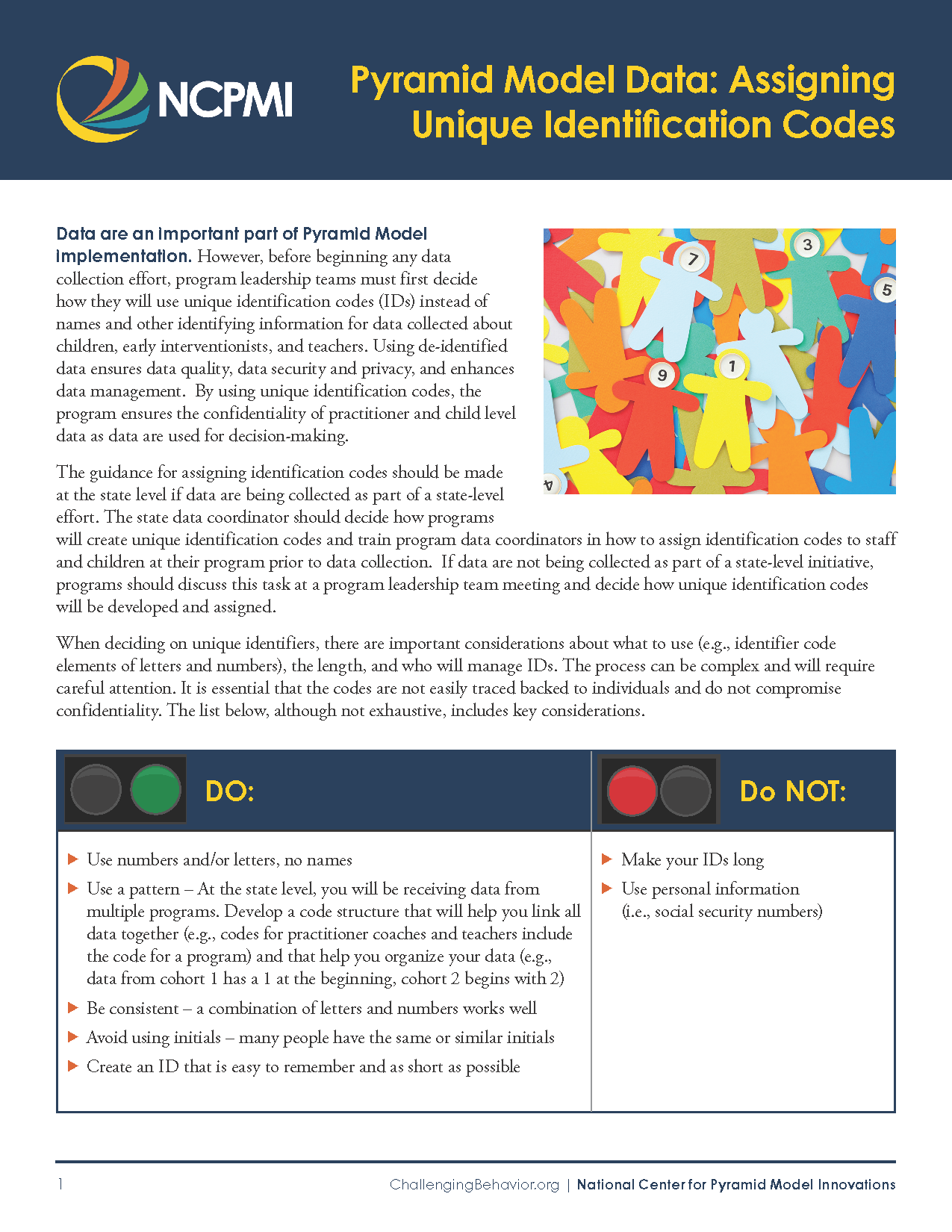
This tip sheet provides guidance for program leadership teams on establishing unique identification codes (IDs) instead of using names and other identifying information for data collected about children, early interventionists, and teachers.
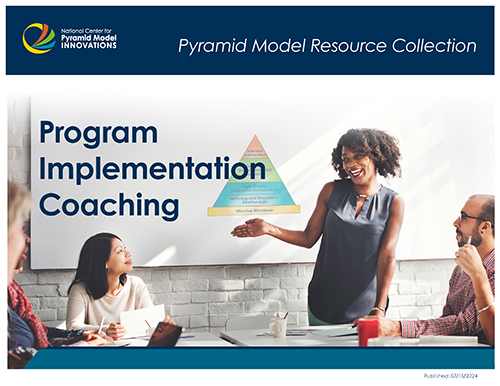
This NCPMI Program Implementation Coaches Resource Collection provides program implementation coaches with selected tools to support their work with state, community, and program-wide leadership teams.

This fact sheet describes the various roles and responsibilities of Program Implementation Coaches and their work with state, community, and program leadership teams.

This resource collection offers information and materials for states, communities, and early childhood programs seeking further information on Infant and Early Childhood Mental Health Consultation (IECMHC) and the integration with the Pyramid Model.
Created: 7/15/2025
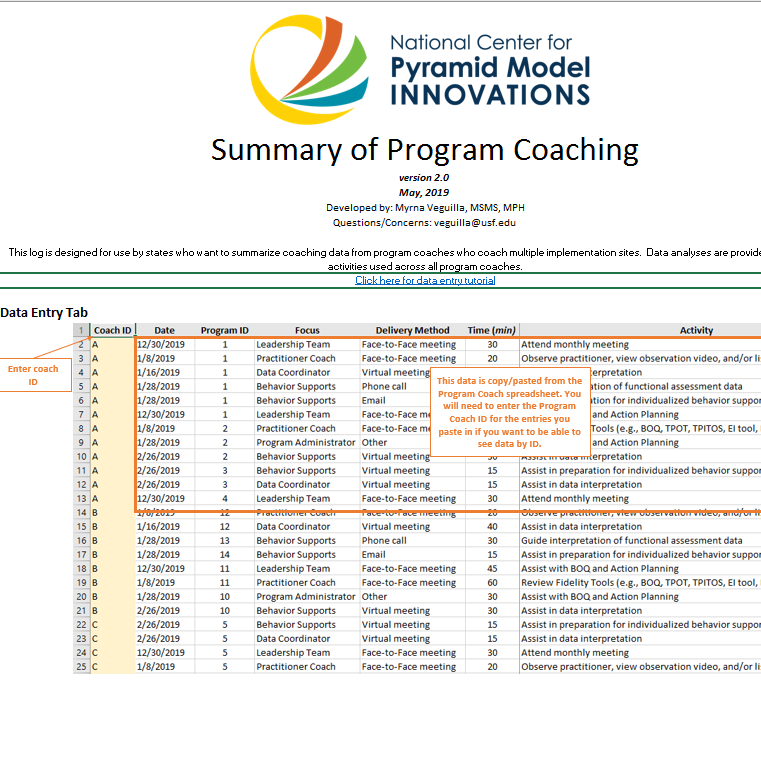
The State Summary of Program Coaching log is used by states to summarize coaching data from program coaches who coach multiple implementation sites.
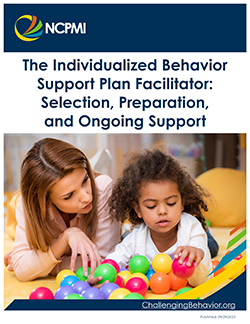
This resource outlines guidance for identifying, preparing, and supporting practitioners responsible for facilitating the development and implementation of individualized positive behavior support (IPBS) plans in early childhood Pyramid Model settings.

